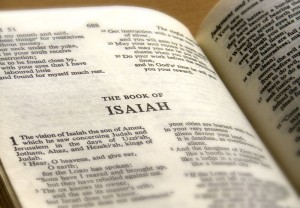Monthly Archives: January 2013
Isaiah – the Bible in miniature
 – David Pawson, Unlocking the Bible
– David Pawson, Unlocking the Bible
Isaiah is (also) fascinating because of the way the book has been arranged in our Bibles. The chapter headings in the Bible are not inspired. (I wish we had a Bible without chapter and verse numbers, because then we would know our Bibles according to the flow of thought, and not in an artificial way according to ‘texts’, as we do today. For at least 1,100 years the Christian Church had Bibles without any chapter and verse numbers.)
But whoever divided Isaiah into chapters did a rather interesting thing, though I doubt whether it was deliberate. They divided the book into 66 chapters, the same number as the books of the Bible. Furthermore, they divided Isaiah into two distinct parts of 39 chapters and 27 chapters. It just happens that the Old Testament has 39 books and the New Testament 27.
Also, the message of the first 39 chapters summarizes the message of the Old Testament, and the message of the last 27 chapters summarizes exactly the message of the New Testament! The second part of Isaiah (i.e. chapter 40) begins with the voice crying in the wilderness, ‘Prepare the way for the Lord’ – words later used by John the Baptist. It moves on to a servant of the Lord who is anointed by the Holy Spirit, dies for the sins of his people, and is raised and exalted after his death. It then moves on to the declaration that ‘You shall be my witnesses to the ends of the earth’, and it finishes up with God saying, ‘I am making all things new. I create a new heaven and a new earth.’
In other words, if someone took the whole Bible and squeezed it into one book, you’d finish up with the prophecy of Isaiah. It is the Bible in miniature.
Even more remarkable is the fact that chapters 40-66 divide very clearly into three sections, each of nine chapters. So in chapters 40-48 the theme is comforting God’s people; in chapters 49-57 the theme is the Servant of the Lord, who dies and rises again; and chapters 58-66 are about the future glory.
Furthermore, each of these sections of nine chapters divides into three sections of three chapters. If you take the middle three there are three very clear sections; 49-51, 52-54 and 55-57. If you take the middle section (chapters 52-54), and the middle verse of the middle chapter of that middle section, you come to the key verse in the book: ‘He was pierced for our transgressions, he was crushed for our iniquities; the punishment that brought us peace was upon him, and by his wounds we are healed’ (53:5). None of this is inspired as such, but it is remarkable that even the central verse of the second section should sum up the central theme of the New Testament.
